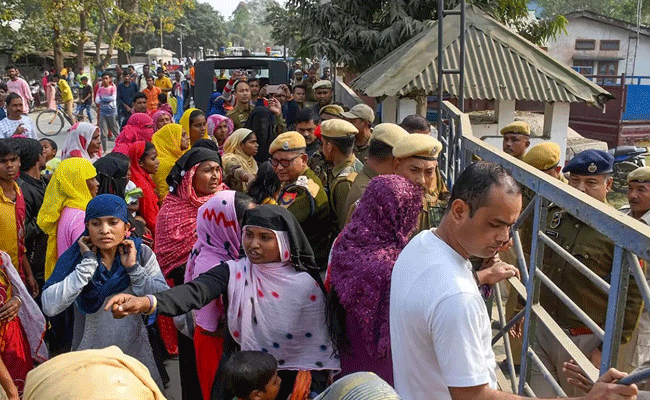Guwahati (PTI): Amid protests in Barak Valley, Morigaon and Dhubri, the crackdown on child marriage in Assam entered the fourth day on Monday, with the number of arrests rising to 2,441.
A police statement said the arrests have been made based on 4,074 FIRs filed across the state.
"Total arrest so far - 2441. Crackdown against child marriage continues in Assam," Sarma tweeted.
He had earlier asserted that the drive will continue till the 2026 assembly elections.
The crackdown has faced criticism from the opposition, and demonstrations at various places by the affected families.
Protests were staged in different parts of the state including in Barak Valley, Morigaon, Dhubri and Nagaon districts, by the affected families.
"Our menfolk have been taken away by the police, leaving us without anyone to look after us or to provide for us," said Redshma Khatun, one of those protesting at Dhubri.
Till Sunday evening, 139 people were apprehended in Biswanath district, followed by 130 in Barpeta and 126 in Dhubri, the statement said.
Dhubri registered the highest number of FIRs against child marriages at 374 cases, followed by Hojai (255) and Morigaon (224), it added.
Meanwhile, seven people got bail in child-marriage cases in Rangia in Kamrup district.
The court of sub-divisional magistrate (SDM), Rangia, granted bail to the accused, a lawyer said.
"More are likely to get bail here by the end of the day," he said.
Sarma had earlier said those facing Prohibition of Child Marriage Act (PCMA) charges are under bailable sections, but the ones held under POCSO will face non-bailable charges.
Questioning the motive behind the crackdown, AIMIM chief Asaduddin Owaisi said that the Assam government should have concentrated on increasing literacy levels if it was actually seized of the problem of child marriage.
"Experts have said that if you want to stop child marriages, you have to open a lot of schools, (but) you have not done that. You have closed down the madrassas too which were imparting some form of education," he alleged.
Owaisi sought to know who will be responsible for the women left in the lurch following the arrest of the men of the house.
Assam Congress president Bhupen Bora said a humane approach was needed in dealing with the issue.
"We are opposed to child marriage. But what will be the benefit of disrupting settled families, with grown up children? It is nothing but a publicity stunt," he said.
Assam Jatiya Parishad chief Lurinjyoti Gogoi alleged that the government went ahead with the crackdown without assessing its impact on the people.
"The government should have thought of the situation the wives, families will face when the arrests happen. It was a haphazardly executed step," he maintained.
The AIUDF had on Saturday claimed that the Assam government crackdown on child marriage was conducted "without framing the requisite rules".
The state cabinet had recently approved a proposal to book men who have married girls below 14 years of age under the Protection of Children from Sexual Offences (POCSO) Act.
Cases under the Prohibition of Child Marriage Act, 2006 will be registered against those who have married girls in the 14-18 years' age group, the cabinet decided.
The offenders will be arrested and the marriages declared illegal. If the groom is below 14 years of age, he will be sent to a reform house.
Assam has a high rate of maternal and infant mortality, with child marriage being the primary cause, according to reports by the National Family Health Survey (NFHS).
Let the Truth be known. If you read VB and like VB, please be a VB Supporter and Help us deliver the Truth to one and all.
Panaji (PTI): As part of a crackdown against tourist establishments violating laws and safety norms in the aftermath of the Arpora fire tragedy, Goa authorities on Saturday sealed a renowned club at Vagator and revoked the fire department NOC of another club.
Cafe CO2 Goa, located on a cliff overlooking the Arabian Sea at Vagator beach in North Goa, was sealed. The move came two days after Goya Club, also in Vagator, was shut down for alleged violations of rules.
Elsewhere, campaigning for local body polls, AAP leader Arvind Kejriwal said the fire incident at Birch by Romeo Lane nightclub at Arpora, which claimed 25 lives on December 6, happened because the BJP government in the state was corrupt.
An inspection of Cafe CO2 Goa by a state government-appointed team revealed that the establishment, with a seating capacity of 250, did not possess a no-objection certificate (NOC) of the Fire and Emergency Services Department. The club, which sits atop Ozrant Cliff, also did not have structural stability, the team found.
The Fire and Emergency Services on Saturday also revoked the NOC issued to Diaz Pool Club and Bar at Anjuna as the fire extinguishers installed in the establishment were found to be inadequate, said divisional fire officer Shripad Gawas.
A notice was issued to Nitin Wadhwa, the partner of the club, he said in the order.
Campaigning at Chimbel village near Panaji in support of his party's Zilla Panchayat election candidate, Aam Aadmi Party leader Kejriwal said the nightclub fire at Arpora happened because of the "corruption of the Pramod Sawant-led state government."
"Why this fire incident happened? I read in the newspapers that the nightclub had no occupancy certificate, no building licence, no excise licence, no construction licence or trade licence. The entire club was illegal but still it was going on," he said.
"How could it go on? Couldn't Pramod Sawant or anyone else see it? I was told that hafta (bribe) was being paid," the former Delhi chief minister said.
A person can not work without bribing officials in the coastal state, Kejriwal said, alleging that officers, MLAs and even ministers are accepting bribes.





